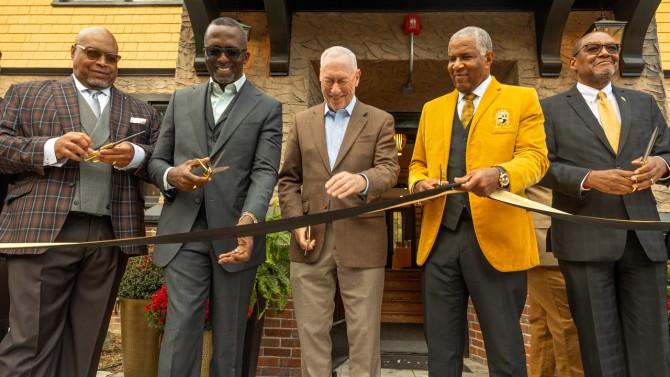The first Black Greek organization in the nation is celebrating a new milestone in its illustrious history.
Alumni brothers of Alpha Phi Alpha's Alpha chapter, founded at Cornell in 1906, unveiled a new leadership institute and student residence, inspired by the fraternity's founding principles and honoring its 119-year legacy at Cornell.
A crowd of alumni fraternity brothers and the Alpha Light Fund, a social impact nonprofit they lead, on Oct. 18 dedicated the House of Alpha Leadership Institute at 105 Westbourne Lane, in Ithaca's Cornell Heights Historic District. The institute welcomes student residents from all backgrounds who are committed to leadership, justice and equity, regardless of fraternity affiliation.
President Michael I. Kotlikoff (center); Robert F. Smith '85 (center right), founder, chairman and CEO of Vista Equity Partners and a member of Alpha Phi Alpha fraternity; and Dr. Dennis Mitchell '84 (far right), founding president of Alpha Light Fund, join Alpha Phi Alpha dignitaries on Oct. 18 at the dedication of the House of Alpha Leadership Institute.
President Michael I. Kotlikoff also spoke at the event, which alumni brothers of the Alpha chapter traveled from all over the country to attend.
The fraternity, open to all races, is the largest predominantly Black fraternity in the country. Its alumni include the Rev. Martin Luther King Jr., W.E.B. Dubois, Duke Ellington and Thurgood Marshall, as well as Robert F. Smith '85, founder, chairman and CEO of Vista Equity Partners, who purchased the building in 2023 for $1.5 million.
Smith also purchased 411 E. State St., the fraternity's birthplace, which will be made into a monument. He donated the Westbourne Street property to Alpha Light Fund and funded its renovated with an additional $9 million donation.
At the event, Smith spoke about how he found a community at the fraternity when he arrived at Cornell as a freshman, far from his home in Denver. "These brothers welcomed me, in so many ways, to a new reality of opportunity, and that's what the Alpha Phi Alpha, Alpha chapter, is all about."
The event also launched a $20-million fundraising campaign to support programming at the institute, said Dr. Dennis Mitchell '84, founding president of Alpha Light Fund and a professor of dental medicine at Columbia University.
"We're here to celebrate a vision of empowered leadership and active community building," Mitchell said. "It's a vision rooted in cultural legacy, in collaboration and in sustainable impact."
Describing the institute, Mitchell said, "This is a space built for growth, grounded in intention and open to all."
Mitchell opened the celebration with a short history of the Alpha chapter. In the early 1900s, Cornell was one of the few major universities that welcomed Black students. But social segregation of the time prohibited them from living in campus housing. Instead, Black students lodged with local Black families. Many worked as cooks, janitors and waiters at fraternity houses that would not admit them, Mitchell said, where they witnessed the support and academic and social success that living in community could bring.
So they formed a literary society that became Alpha Phi Alpha, in 1906. "They created something new. Out of exclusion, they built belonging. Out of invisibility, they built visibility," Mitchell said. "… There's a reason that that spark is lit right here at Cornell University and not anywhere else, and more than a century later, that spark continues to burn."
Mitchell and Kotlikoff noted that Cornell has a foundational commitment to equality and access, established with a then-radical vision of being an institution where any person could find instruction in any study.
"Over the years, it's a commitment that's been questioned and tested many times," Kotlikoff said. "Those founding values continue to guide us and ensure that Cornell remains committed to building a more just and equitable society through the education of the next generation of scholars and leaders. Alpha Phi Alpha's founding at Cornell in 1906 is a critical part of that history, and its legacy is part of our identity today."
Christian Flournoy '27, a human biology, health and society major on a pre-med track in the College of Human Ecology, said the institute represents an enormous opportunity. "It's really been great to see the amount of impact and desire people have wanted to put into this house and to see it come to fruition," said Flournoy, who is also executive vice president of the Student Assembly, a member of Cornell's sprint football team and aims to become an orthopedic surgeon. And being surrounded by so many brothers of older generations was "uplifting," he said. "So many people are here to support and celebrate this house."
Attendees included New York State Assemblyperson Anna Kelles (D-125th District) and Ryan Lombardi, Cornell vice president for student and campus life.
The 9,000 square-foot house was built in 1927 and was formerly owned by the Tao Kappa Epsilon fraternity.
The institute, Smith said, demonstrates "… that together, we can accomplish great things."
"And I look forward to this next generation using these investments that this current generation is putting in you to change and reshape the world so it fits all that you are capable of, and America becomes the vision of what it should be, through your work … ."
He closed his remarks by saying "One Nine," to which the crowd responded with a rousing, "Oh-six."







